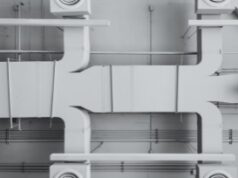
R&D Tax Savers firm members had the distinct pleasure of presenting on hotel EV charging stations at the HX: The Hotel Experience trade show on November 12 to 13 at the Javits Convention Center in New York City. EV Charging is one of the many newer technologies installed at hotels on a national basis. The hotel industry is at the center of technology improvements and 61 percent of hoteliers plan to increase technology spending from prior year amounts. Hotel owners and hotel project designers are eligible for R&D tax credits for their technology initiatives.
The Research & Development Tax Credit

Enacted in 1981, the now permanent Federal Research and Development (R&D) Tax Credit allows a credit that typically ranges from 4 percent to 7 percent of eligible spending for new and improved products and processes. Qualified research must meet the following four criteria:
- Must be technological in nature;
- Must be a component of the taxpayer’s business;
- Must represent R&D in the experimental sense and generally includes all such costs related to the development or improvement of a product or process; and
- Must eliminate uncertainty through a process of experimentation that considers one or more alternatives.
Eligible costs include U.S. employee wages, cost of supplies consumed in the R&D process, cost of pre-production testing, U.S. contract research expenses, and certain costs associated with developing a patent.
On December 18, 2015, President Obama signed the PATH Act, making the R&D Tax Credit permanent. Beginning in 2016, the R&D credit can be used to offset Alternative Minimum tax for companies with revenue below $50 million and for the first time, startup businesses can obtain up to $250,000 per year in payroll taxes and cash rebates.
Hotel Technology Spending
According to Hospitality Technology’s 2018 Lodging Technology Study, hotel tech spending in 2018 increased to 4 percent of the total industry revenue. Software is the most common tech investment, with 35 percent investing in this category. The top cited tech objectives were to improve digital customer engagement and improve analytics, both of which are expected to result in improved customer outreach, understanding, and loyalty.
Although hoteliers are eager and willing to invest in technology, many have cited the lack of available resources as a mitigating factor to investing or investing more. Hospitality Technology’s survey found that 40 percent of respondents believe that their lack of budget is a major challenge for investing in tech, and 33 percent cite the return-on-investment (ROI) as a reason. The R&D Tax Credit however can address these concerns, as companies investing in tech are able to receive a portion of their investment back in the form of a tax credit.
Leading Hotel Technologies
In the hotel industry, the top 10 technologies that our clients are implementing are:
- Audio-Visual (A/V)—Current A/V technology is crucial to hotel meeting and banquet areas, and for guests expecting state-of-the-art systems that are often found in high-level home systems.
- Virtual Reality—Virtual reality measures are developed and implemented to present guests and meeting planners with the option to experience the facility beforehand, with interactive 360-degree views and walkthroughs.
- Lobby Design—The lobby is the first physical customer interaction with the facility, and design elements are crucial for a first impression. Complex design and decision-making are often associated the lobby, and this includes layout, lighting, HVAC controls, elevators, and furniture.
- Restaurant Technology—Restaurant tech is a world unto itself and includes table based ordering and mobile payment systems, dining rewards systems, and robot liquor dispensing.
- Kitchen Technology—Kitchen technology includes substantially improved equipment that provides a wider variety of cooking methods with improved preparation times and higher meal quality. Kitchens are also increasingly turning to digital inventory tracking to better analyze how often and how much product should be stocked.
- Automated Telephone Systems—With increased travel demand, reservation systems are increasingly sophisticated to provide a myriad of options and reflect seasonal demand. Additionally, hotels are turning to automated phone systems for activities ranging from room service ordering to wake-up calls. Hotel automated telephone systems are the center of a major R&D Tax Credit case where the taxpayer was very successful (Suder v. Commissioner).
- Service Software—Hotels are essentially service businesses with large staffs. Many new software programs are being developed and implemented to optimize staff activities, including shift scheduling and room cleaning.
- Green Lodging—Energy efficiency is a large growth area and includes (but is not limited to): solar P.V., geothermal, chillers, other forms of alternative energy, lighting, HVAC and building controls and water conservation.
- Enterprise, Mobile and Cloud Software—Specialized software utilized by hotels typically require integration with the hotel’s core enterprise system and increasingly mobile applications, with the resulting data stored in the cloud for easy access. Innovators are developing applications that allow guests to perform tasks utilizing smartphones.
- Security—Hotels are integrating modern technologies for site and room security. Improved camera systems are integrated for high-level physical and operational security, and room security is increasingly provided by card or mobile systems.
Future Tech in Hotels
In their 2018 Lodging Technology Study, Hospitality Technology conducted surveys of representatives from more than 60,000 hotel properties. Within the surveys, hoteliers were asked to identify which emerging technologies have significant potential to change the industry. Approximately 70 percent of respondents believe that artificial intelligence could transform the hotel industry, with uses that include chatbots and digital concierge providing potential cost reductions. Other notable technologies listed include radio-frequency identification (RFID) for hard goods (48 percent), interactive walls (38 percent) and blockchain/digital currency (29 percent). These technologies are starting to gain traction in other applications and may soon be feasible throughout the hotel industry.
Conclusion
Various technologies are transforming all facets of the hotel industry. In an increasingly competitive industry where improving the customer experience is imperative, hotels can recoup a portion of their technology investments by utilizing the now permanent R&D Tax Credit. Many of these technologies can qualify if properly analyzed, researched and tested.
About the Authors
Charles Goulding, Attorney/CPA is President and Raymond Kumar, CPA is a Tax Manager at R&D Tax Savers, a leading provider of R&D Tax Credit services. The company is an interdisciplinary firm with backgrounds that include attorneys, CPAs, Professional Engineers, and LEED APs. The company has provided R&D Tax Credits to companies in virtually every industry, and its firm professionals have saved companies more than $400 million in credits to date. Additionally, the firm has published over 100 articles on R&D related topics.







